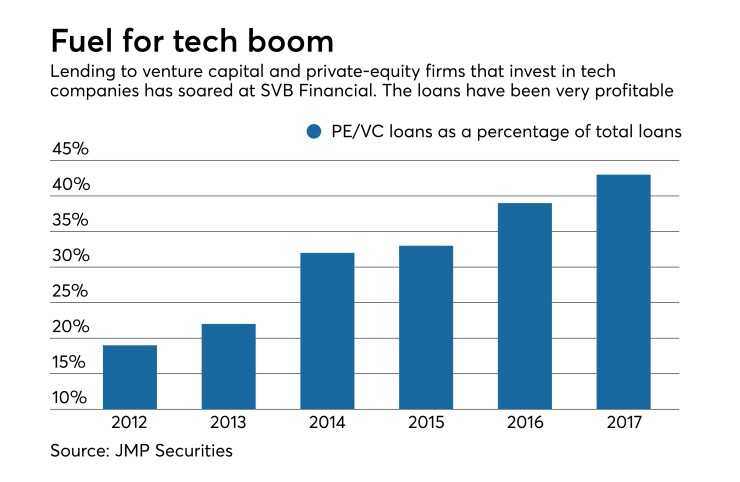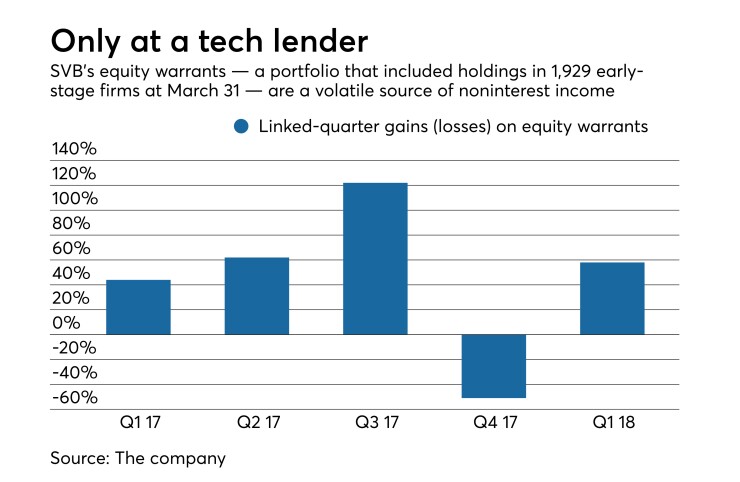For most regional banks, two things are true right now: Commercial loan growth
That is, unless you work at SVB Financial, the parent company of Silicon Valley Bank. One could forgive any peer for asking: What exactly is in the water out there in Santa Clara, Calif.?
SVB reported record profits and gross revenue last quarter and in the full year 2017, and company executives in April predicted that loan growth will reach nearly 20% in 2018. In the first three months of this year alone, the $53.4 billion-asset company added a record 1,300 clients.
At one point during SVB’s first-quarter conference call, an analyst asked if the company has the capacity to handle its recent influx of deposits — described by one analyst as “staggering.” SVB took in just over $9 billion in deposits from Jan. 1 to March 31, a portion of which are held in off-balance-sheet accounts. By comparison, Capital One Financial — which is nearly seven times SVB’s size — added $7 billion in deposits over the same period.

The company has more than doubled its assets in the past five years by carving out a niche at the heart of the tech sector — providing financing to both venture capital firms and the startups they fund.
But SVB’s rise has nonetheless sparked questions about whether its pace of expansion is sustainable over time. While praising the company’s success, analysts have also begun looking for signs that the tech sector has reached its peak — signs, for instance, that the recent surge in venture funding could abate, or that the valuations of upstart firms in California and elsewhere could be inflated.
Greg Becker, CEO of SVB, says he sees no reason for immediate concern.
“You have to believe — I believe — that the innovation economy is the best place to be in the long term,” Becker said in a recent interview with American Banker.
Becker, who has been at the helm since 2011, joined SVB nearly 25 years ago. What’s different about the current venture wave, compared to the early 2000s tech bust, he said, is that technology is more ingrained in people’s everyday lives than ever before, from consumers’ reliance on smartphones to big corporations' splashy investments in all things digital.
“It may go through ups and downs, because all markets do at some point,” Becker said. “But if you’re taking a very long-term view, this is one market that I’m confident is going to be up and to the right over the long term.”
In 2017, total U.S. venture capital investment was $71.9 billion, up 17% from a year earlier, according to a recent research note from JPMorgan Securities. That is still well below the market peak in 2000, when venture investment topped $120 billion.
SVB, of course, is far from alone in serving the so-called “innovation economy,” a world where Uber, Airbnb and other tech giants loom large. Other California regionals, such as
“We compete every day, and aggressively, with large banks and medium-sized banks,” Becker said.
But observers describe SVB as the most dominant company in that market. Dating back to the dot-com boom of the early 2000s, the company developed a niche in serving the needs of the tech sector — from providing short-term loans to venture funds, or advice and, in some cases, credit to early-stage companies.
“They have a unique business model,” said Aaron James Deer, an analyst with Sandler O’Neill. “By virtue of their client base … they are beneficiaries of a tremendous amount of client activity.”
SVB's net income rose 28% from 2016 to 2017, to $491 million, and it nearly doubled year over year to $195 million in the first quarter of this year.
A big part of what has distinguished SVB in the industry has been its aggressive growth in business lines that would make other bankers, who are more risk-averse and unaccustomed to volatility, feel queasy.
Consider the services SVB provides to early-stage companies. In addition to accepting deposits from venture-backed firms, SVB also makes loans to help bridge the gap between funding rounds, or to simply cover operating costs.
To compensate for taking on the extra credit risk, SVB typically takes a small equity stake in the early-stage companies it serves. As of March 31, SVB had warrants in 1,929 private companies, a 9% increase from a year earlier.
Over the same period, the net gains on SVB’s portfolio of equity warrant assets — recorded as noninterest income on its financial reports — nearly tripled, to just over $19 million. The warrants are held by the holding company and not in the bank.

According to Becker, a big part of what has kept SVB’s competitors at bay is the cyclical nature of the business. When startup valuations are high, as they are right now, gains on equity warrants rise and delinquencies on loans to startups remain low.
But that can change quickly — and for the worse.
“It’s good when it’s good, and when it’s not so good, it’s more difficult, and it’s more difficult for banks to wrap their head around,” Becker said.
He added that most of SVB’s equity stakes are “very small” and often don’t result in a payoff because some early-stage clients don't go public or get acquired for modest prices. But the investments sometimes pay off in a big way, such as with the company’s stake in Roku, which went public in September.
SVB sold its shares in the streaming-device service in March, after the lockup period on its shares expired. The company sold Roku shares in late March, at a $22.2 million loss. Over the entire life of the investment in Roku, however, SVB generated a net gain of $46 million, according to the company.
As a general policy, SVB sells its stake in public companies at the soonest possible date, to prevent the appearance of potential conflicts of interest.
“We know a lot about what’s going on in the market, so we don’t want anyone to look at us and say that we’re using that information to time or speculate when we should be selling shares,” Becker said.
The biggest driver of SVB’s growth, though, has been its lending to venture capital and private-equity firms through loans known as a capital call line.
The call lines are used by venture capital and private-equity firms to make investments in private companies. The loans are then paid off with the funds that the firms receive from their own investors.
It’s a line of business that SVB has expanded dramatically, to 43% of its loan book in 2017 from 19% five years earlier, according to a recent note from JMP Securities.
Analysts, however, say they are not concerned about the concentration. Most of the portfolio — about 90% — is focused on private equity, a sector that invests in a diverse range of businesses in addition to tech. The company does not disclose default rates on this portfolio, but a spokeswoman said it has had no material loss in more than 20 years.
“It’s important to note what this is and what this isn’t,” Becker said. He said the private-equity firms that SVB works with are “the most diverse,” working in sectors ranging from natural resources to distressed debt.
The market for private-equity and venture capital funding is expected to remain strong in the years ahead, according to Christopher York, an analyst with JMP Securities.
One reason why is that big tech companies, such as Airbnb and Uber, are staying private longer. Rather than turning to the public debt and equity markets, more companies are raising large rounds of funds from private investors. It’s a market that SVB is well-suited to serve, York said.
“Most people think of SVB as being an innovator in technology,” York said. “But it has also been an innovator in the capital markets.”
If there’s one phrase that you likely won’t hear from SVB and its analysts, it’s this: tech boom.
What follows a boom, of course, is often a bust. Analysts are quick to admit that there are downsides to SVB’s close connections to the tech sector — for instance, its balance sheet could shrink if venture fundraising comes to a halt.
Still, observers feel confident that SVB remains well positioned to continue expanding at a strong pace in the year ahead, as the demand for digital services in all corners of the economy continues to grow. The company, notably, has also recently announced plans to open international offices in
“We’re living in a pretty blessed age in terms of what going on in innovation and the amount of fundraising,” said Deer, the analyst from Sandler, adding that “there’s billions on the sidelines still.”
“They are at the center of it all,” Deer said.
Becker agreed.
“We can make connections and recommendations and advice to these companies because of our history, our experience and what we see every day,” Becker said. “That’s really valuable, and I think it’s really difficult for other institutions to be able to provide that sort of value-add in connectivity that we do.”





